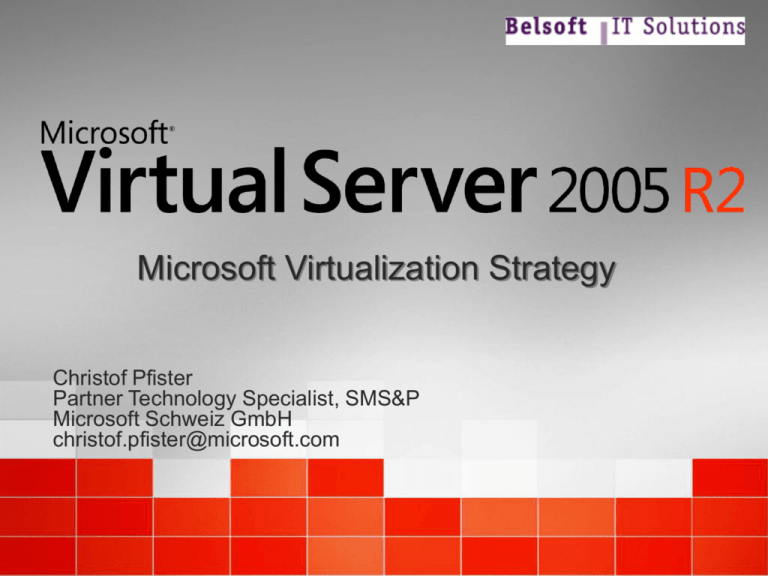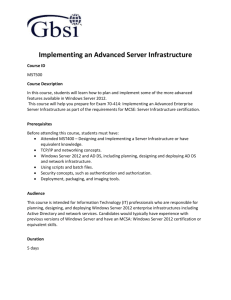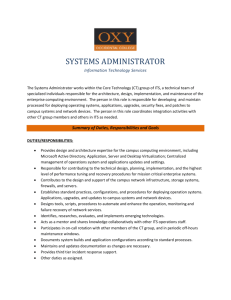Virtual Server 2005 R2
advertisement

Microsoft Virtualization Strategy Christof Pfister Partner Technology Specialist, SMS&P Microsoft Schweiz GmbH christof.pfister@microsoft.com Agenda Microsoft Virtualization Strategy Microsoft Virtual Server 2005 R2 Key Scenarios, Features and Benefits Host-Clustering Virtualization Licensing Roadmap Q&A Increase Availability Server Administrators Increase Responsiveness Lower Operational Costs Application Developers Improve Utilization Systems “Designed For Operations” “Operationally Aware Platform” “Intelligent Management Tools” Designs include all information relevant to management Rich instrumentation and hardware resource virtualization End to End, automated management tools More flexibility and control in the provisioning and use of your hardware resources. Microsoft Virtual Server 2005 R2 The most cost-effective server virtualization technology engineered for the Windows Server System™ platform. Focused on key customer scenarios Consolidate server workloads Automate and consolidate software test and development environments Disaster recovery Reduce costs and improve IT responsiveness Reduce hardware costs by at least 50% Reduce provisioning times by 50-95% Increase administrator productivity Virtual Server 2005 R2 Virtualization Benefits Allows multiple operating systems to run simultaneously on the same processor Each independent virtual machine functions as a self-contained computer Workloads are decoupled from hardware Server consolidation increases hardware utilization Quicker deployment and provisioning of new applications and services Microsoft Virtual Server 2005 R2 Increases operational efficiency Consolidate infrastructure, application, and branch office server workloads Consolidate and re-host legacy applications Simplify disaster and recovery planning Automate and consolidate software test and development environments. Virtual Server Architecture today Guest OS & Applications Guest OS & Applications Virtual Hardware Virtual Hardware Virtual Server 2005 Windows Server 2003 Server Hardware • (Windows NT 4.0 Server)*, Windows 2000 Server, Windows Server 2003 and 3rd party OS supported • No custom drivers required • Runs most x86 operating systems • Up to 1 CPU per virtual machine • Up to 3.6GB of memory per virtual machine • Multi-threaded Virtual Machine Monitor (VMM) provides isolation x86 and x64 • Windows Server 2003 x86 and x64 supported host • Broad device compatibility • Optimized for 2 to 8 way servers(x86, x64) • Scales up to 32 CPUs and up to 64GB Support Policies Virtual Server is full supported (897613, 897614) All server applications except for the following are fully supported Speech Server ISA Server SharePoint Portal Server No physical server repro required 3rd Party Virtual SW is not supported (897615) Applications running in non-Microsoft hardware virtualization software are not supported Premier customers get commercially reasonable effort for problem resolution Requires a physical machine repro VHD Formats and Functionality Dynamically expanding virtual hard disks Fixed-size virtual hard disks Allows conversion of a linked physical data disk to a VHD Differencing virtual hard disks Fixed-extent file that resides on host hard disk Linked virtual hard disks File size grows as data is added Changes stored on a hierarchical “child” disk Specified per-VHD Undo disks Changes can be committed or discarded Specified per-virtual machine Differencing Disks Virtual machine viewpoint: DD = single drive Scenario: testing an application patch Parent R- R- R+ GM Undo SP1 SP2 SP3 SP2 t0 R- t1 R- t2 R- t3 R+ If patch works, drives can be merged VMs can share parent drives VM1 VM2 GM + SP1 Child R+ Host viewpoint: DD = two files on filesystem SP2 Child SP3 GM SP1 SP2 SP3 Virtual Networking Create an unlimited number of virtual networks with these topologies: Guest to network Guest to guest via simulated Ethernet and Virtual DHCP Guest to host system via loopback adapter Administration Easy to Manage Virtual Server Administration Website Enables secure, authenticated administration and client remote access. Microsoft integrated tools and solutions Active Directory integration MOM 2005, ADS, SMS 2003 SP1 Physical server equivalency Use existing management tools Virtual Server Management Pack for Microsoft Operations Manager 2005 Management Pack for MOM 2005 Displays all hosts including knowledge of physical vs virtual Generate scripts leveraging COM API to automate tasks MOM 2005 – Single pane for managing physical servers to virtual machines Mapping guests to host with visibility into server health Consolidated health status and reporting Provides one to many monitoring and control Available as a free download Fine grained control over virtual machines (guests) Virtual Server Migration Toolkit Command line tools to help automate P2V migration Leverages Automated Deployment Services (ADS) Provides V2V functionality also It is for free :-) Verify suitable configuration, capture image and generate task sequences to use with ADS NT 4.0 Server Transform ADS image to VHD and deploy to new target system W2K3 Server with ADS 1.0 & VSMT Configure new virtual machine running NT4 and legacy applications W2K3 Server w/Virtual Server & VSMT The State of 3rd party products for Virtual Server 2005 3rd party Solutions for Virtual Server 2005 divided into very concentrated focus areas: Physical to Virtual - Virtual to Physical – PlateSpin Virtual Machine Lifecycle Management LeoStream High Availability and Virtual Machine Clustering support – PolyServe Virtual Server 2005 R2 Host Clustering What’s new in Virtual Server 2005 R2? Host Clustering, Support for additional hosts and 3rd party guests (Linux) x64 host support Performance improvements Higher availability Support for iSCSI allows clustering virtual machines across hosts and Virtual Server host clustering allows availability for both planned and unplanned downtime using SAN, iSCSI or direct attached storage.!!! Greater performance for virtual machines running memory-intensive applications PXE network boot support Hyperthreading F6 Disk Virtual Disk Precompactor Open necessary ports at install time Reserve space for saved states Virtual Server 2005 R2: Overview Higher Availability Virtual Machine Clustering: Support for iSCSI allows clustering virtual machines across hosts Virtual Server R2 Host Cluster support The ability to cluster Virtual Server hosts. Planned downtime: Servicing the host hardware or patching the host operating system Virtual machine migration. Virtual machines can be moved from one cluster node to another with minimal downtime. (Downtime dependent on speed of storage infrastructure) Less than 10 seconds to move 128 MB vm via 1GbE iSCSI (faster on SAN) Unplanned downtime: Virtual Server host clustering uses Windows Server 2003 clustering Virtual Server host clustering supports SAN, iSCSI or direct attached storage Failover to another cluster node due to hardware failure Other benefits: Guest OS agnostic. Any virtual machine running any OS can be moved or failover to another cluster node FREE. Virtual Server host clustering will be available as a free download in the same time frame as Virtual Server 2005 R2 Out-of-the-Box High Availability Virtual Server 2005 R2 host cluster: Host updating WSUS server Shared Storage WSUS Shared Storage Node 1 Node 2 VM VM Node 3 VM Administrator wants to update node 1 with Windows Server Update Services Microsoft Cluster Administration Console saves the state of virtual machines and restores them on another node Node 1 is ready for update installation Out-of-the-Box High Availability Virtual Server 2005 R2 host cluster: Unplanned downtime Shared Storage Shared Storage Node 1 Node 2 Node 3 X VM VM VM Node 1 suffers a power outage or a network failure A simple script attached to the Microsoft Cluster Administration Console notices the lack of heartbeat and starts the virtual machines associated with node 1 on other nodes Licensing Windows Server R2 Enterprise Edition Windows Server R2 Enterprise Edition INCLUDES 4 Instances Windows Windows Windows Windows Virtualization Layer Windows Server 2003 R2 EE Hardware Current License Model : New with Windows Server R2 EE: Total: 5 Windows Licenses Total: 1 License Add an additional license and get up to 4 more guests Windows Server “Longhorn” Datacenter Edition will allow unlimited guests! Licensing by Running Instance License by “running instances” Library with 100 images of Windows 7 Servers running images (1 per server) Promotes the use of virtualization and a more dynamic data center Create as many images as you would like Store the images where you need them Current License model Total: 107 Windows Licenses New License rights: Total: 7 Windows Licenses License the machine for the instances you use. Virtual Server 2005 R2 Product Overview Virtual Server 2005 R2 Standard Edition 99$ Virtual Server 2005 R2 Enterprise Edition 199$ Roadmap Virtual Server 2005 R2 SP1: Overview Benefits Support for Intel VT and AMD Pacifica technology Non-Windows will be much faster Generally, Windows performance is neutral We already tune and optimize for Windows Windows installation is faster Linux OS/2 Netware Milestones Beta publicly available in Q1/CY06 Beta: Greater than 6 months Maintain consistently high product quality Virtual Server 2005 R2 SP1 scheduled to ship in Q3/CY06 Windows Server Virtualization Longhorn Wave VHD format: Royalty-free license Enables migration from Virtual Server to Windows hypervisor Windows Hypervisor: Powerful virtualization built into the Windows platform Management tools Windows Virtualization for Servers Some features 32-bit and 64-bit guests x64-only hosts Guest multiprocessing Virtualized devices WMI management and control API Save & restore Snapshoting CPU and I/O resource controls Tuning for NUMA (Non-Uniform Memory Access) Dynamic resource addition & removal Live migration

